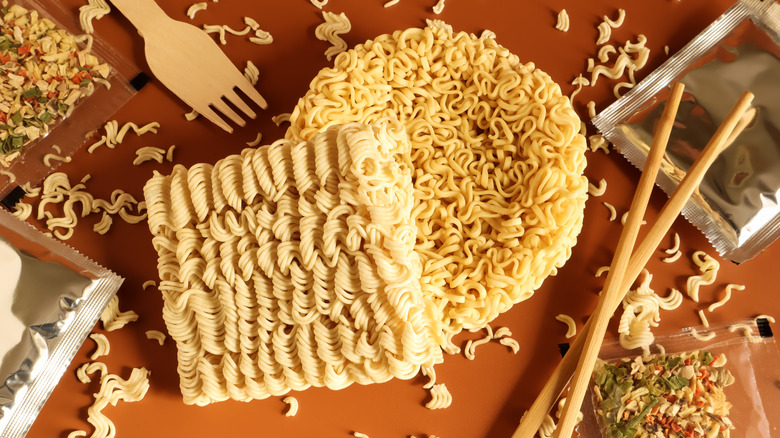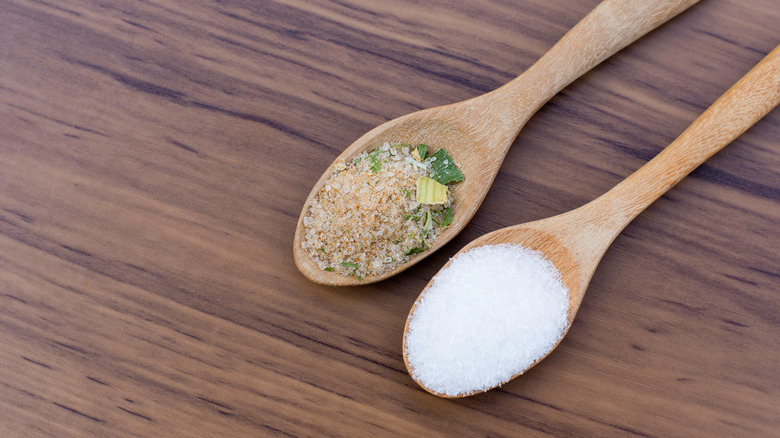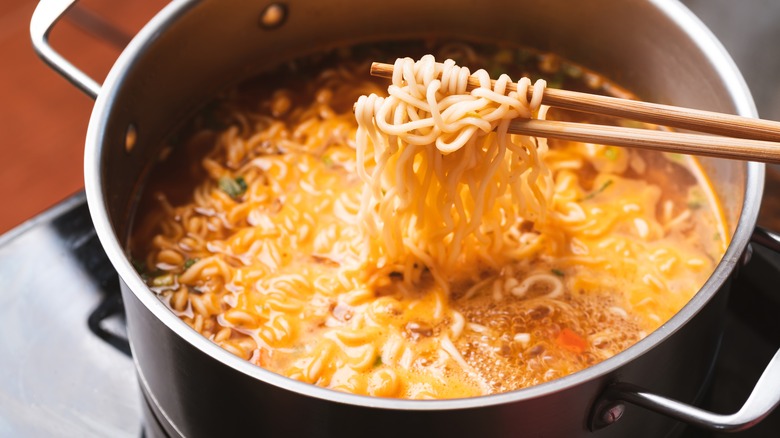How Is Ramen Seasoning Made?
Whether you're slurping up a simply prepared pack of instant ramen or adorning it with toppings to turn it into a restaurant-worthy bowl, there is no doubt that convenience food is a pantry staple for many. Packaged ramen noodles come in a dizzying array of options and nearly all of them are seasoned with a tiny packet of nondescript powder. Those granules pack a serious, salty, umami punch, but what is really in one of those packets of seasoning? The specific ingredients will vary from brand to brand, but in general, ramen seasoning packets are made with a combination of salt, sugar, spices, dehydrated vegetables, and powdered soup base, as well as some preservatives, proteins, starches, and oil.
The soup base component is made of dehydrated and powdered meat, but the vegetarian versions will be made up of just dehydrated vegetables. It is worth noting that even though the flavor on the label may not mention meat, there may still be meat products in the mix. For example, Maruchan chili and soy sauce flavors both contain beef extract. However, the same flavors from Nissin Top Ramen do not contain any meat.
What about the MSG?
Ramen seasoning packets can be flavor-heavy hitters because of the frequent addition of monosodium glutamate, or MSG. MSG is an amino acid that occurs naturally in many foods and can also be commercially produced, though the human body cannot differentiate between the two sources, notes Healthline. It gives a savory umami taste and literally makes your mouth water.
While many people have reported negative health effects from consuming foods with MSG, the Mayo Clinic notes that there is no research to substantiate these claims. In the 1960s, the myth that MSG is harmful was born from anecdotal stories about experiencing symptoms after eating at Chinese restaurants and two extremely limited and flawed research studies that were published in scientific journals and reputable newspapers. These adverse reactions were given the moniker "Chinese restaurant syndrome" despite the fact that MSG has long been used in snack foods, soups, deli meats, packaged sweets, and many other products, not just pan-Asian foods. While the belief that MSG is unhealthy is still widely held, public awareness is changing, especially because prominent figures in food like David Chang and Anthony Bourdain lauded the ingredient.
MSG occurs naturally in numerous foods such as parmesan cheese, cheddar cheese, seaweed, fish sauce, mushrooms, miso, kimchi, clams, oysters, peas, mushrooms, tomatoes, potatoes, and corn. Commercially produced MSG is typically made from fermenting sugar beets, cane sugar, or molasses. Ramen seasonings often include a mix of added MSG and ingredients with naturally occurring MSG.
What kinds of ramen seasonings are out there?
Brands like Nissin Top Ramen and Maruchan are affordable classics that are widely available in the United States with familiar flavors like chicken, shrimp, beef, and pork. The Nissin Roah brand has a tonkatsu flavor that features ginger, scallion, and white sesame seeds, and Maruchan has a yakisoba line that features a cheddar flavor that contains dehydrated cheese and sour cream.
Indonesian brand Indomie Mi Goreng has a seasoning packet that contains the usual suspects of MSG, garlic powder, and onion powder, but also has four other little packets — seasoning oil, chili sauce, soy sauce, and fried shallots. Korean brand Nongshim Shin Ramyun has a ramen seasoning made with black pepper, garlic, and red chili powder, a dehydrated vegetable flake packet with mushrooms, bok choy, green onion, and carrot, and noodles that contain green tea extract. Maggi instant noodles are very popular across India and Southeast Asia. The masala flavor includes a long list of spices — red chili powder, turmeric, cumin, coriander, ginger, fenugreek, aniseed, clove, cardamom, and nutmeg.
You have so many options when it comes to deeply flavored instant ramen noodles, and if for some reason you have extra seasoning packets lying around, don't let them languish alongside those packets of ketchup. Sprinkle on roasted vegetables, popcorn, marinades, stews, dry rubs, fried snacks, and more. No matter how you use them, ramen seasoning packets drop an unmissable flavor bomb.



